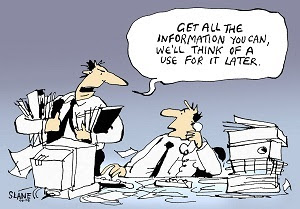Class Reader
SAP’s Enterprise System Cloud Transformation
Article: SAP Cloud Sales Should Benefit From Growing SaaS ERP And SCM Offerings
http://www.forbes.com/sites/greatspeculations/2014/09/18/sap-cloud-sales-should-benefit-from-growing-saas-erp-and-scm-offerings/
SAP, an already established corporation in the Enterprise system market, recently began offering its system as an on-demand System as a Service (SaaS) on its own cloud-based platform.
This article specifically analyzes the company’s Supply Chain Management (SCM) and Enterprise Resource Planning (ERP) software market trend as a result of the transformation.
Questions:
1. Do you think this business transformation was a worthwhile risk for a company that was already an enterprise system market leader?
2. What do you think are some disadvantages to having an enterprise system on a cloud-based platform?
3. What do you think are some advantages to having an enterprise system on a cloud-based platform?
4. Do the advantages outweigh the disadvantages in your opinion?
Data Centers in Rural Washington Gobble Power
This article covers the events that occurred in a rural area when Microsoft decided to open up large data centers in the region. These data centers, which in the articles are described as the physically entity of “the cloud” began consuming very large amounts of electricity and causing pollution to the nearby area. Microsoft often put up quite a fit when it came to paying fines related to different electric and environmental issues.
The internet, especially the cloud, is not something we generally associate with pollution. Tech companies, as stated in the article, have given us the impression that they are more “sleek” and “clean” than traditional, older companies. We rarely consider the insanely large amounts of power needed to fuel the massive data network we live in today.
1) Have you associated new data like “the cloud” with old fashion pollution? Or, as stated in the article, did the new tech companies appear to give off a cleaner, sleeker image?
2) Is this an issue to be worried about? Technology and the demand for data is growing at an exponential rate – we constantly need more and more space for data. Do you think that the demand for data centers like the ones in this article could get so high that the pollution produced could become as bad as something like oil?
3) Do you think it is right for companies like Microsoft to go into small rural towns and put such a giant demand on the resources (ex. electricity) of the town?
Information Systems and Business
http://www.nytimes.com/2010/09/21/technology/21blue.html?_r=0
This article shows that a lot of businesses who are doing well tend to buy business intelligence companies.
1) Why do you think it is beneficial for such companies to purchase a data warehouse company?
2)Information systems related to business intelligence can also help forecast the future results of the company, do you think that people are going to lose their jobs because of that? Also, what do you think is more accurate, an information system or an employee?
3) Can companies use information systems unethically? How?
The Power of Online Reviews
http://www.entrepreneur.com/article/236891
Chapter 5 talks about the power of product reviews and how they can effect the sales of a product. The article provides detail on how important online reviews can be to a consumer “According to Nielsen’s latest Global Trust in Advertising report, online consumer reviews are already the second most trusted source of brand information and messaging, with 70 percent of global consumers indicating they trust online reviews, an increase of 15 percent in four years.”
The article discusses some predictions in the product review trends. It talks about how companies can evolve with it and provide a more interactive experience between a business and the consumer. The five predictions in changing review trends include that reviews will no longer be anonymous by being linked to social networks, consumers will turn to people within their network for trusted/expertise opinion, consumers will be able to view info about the reviewer along with past reviews, product reviews will be personalized and companies will provide a better snap shot of what info the consumer is looking for in a review.
Personally, I am a review reader but I typically don’t write reviews. Reviews have had an impact on whether or not I buy a product. Do you read reviews? Does it impact your buying decisions? Do you write reviews?
If these kinds are changes are implemented, do you think it would deter negative competitor reviews? Why?
How could these changes effect buyer decisions? And how would it effect how companies present reviews and respond?
Have a good night!
How does social-media marketing tactics affect you?
“A clear majority of Americans say social media have no effect at all on their purchasing decisions.” I tend to think that’s a little extreme. Personally, I like to read reviews and background information on a product before purchasing it. Social media has made this process that much easier for me. See something you like, search for it on Google, read comments and then make the purchase.
The article describes five factors on how social media marketing has little purchasing affects. Do you agree or disagree? Before social media, how did you determine whether to buy a new product or not? Do u think companies go to the extreme to get our attention?
http://www.entrepreneur.com/article/237316
Shop Small or Big???
Shop Small or Shop Big?


Online Shoppers are Rooting for the Little Guy
http://www.nytimes.com/2012/01/16/business/some-shoppers-rebel-against-giant-web-retailers.html?pagewanted=1&_r=1&ref=ecommerce&adxnnlx=1391803707-ErAWzPpO03O/bB7AJYZIPw
This article talks about the struggles small online shops have competing against big sites like amazon.com, the tactics they’ve adopted to compete against larger sites, and the consumers who are making a conscious effort to shop small even if it may cost them more money.
Online retailers such as Amazon and Zappos have developed a bully reputation among some because they push out the small “mom-and-pop” shops with their low prices, free and quick shipping and wide variety selections. These independent shops have had to get creative by offering exclusive brands or designs, and even some “freebies” included with purchase (positive incentives), and by preventing price comparisons (negative incentives). Amazon does offer small business the opportunity to sell on their website through their Marketplace program, thus giving businesses the opportunity to reach a larger customer base, but even so, independent businesses cannot compete price-wise.
1. Do you think websites such as Amazon.com or Zappos are bullies to small shops? Why or why not?
2. What would motivate you to shop from a small business (possibly paying a higher price) rather than a larger company online?
3. If you had an online business, what tactics or incentives would you use to compete with Amazon?
Retailers Strategy to E-Marketing
Hey Everyone, in this weeks readings we learned the essential components of the E-Commerce world and all of us are exposed to this whether at work, school, or everyday life. The article that I have provided, “E-Commerce Practices That Are Costing Coversions,” is a brief look into some potential problems retailers face when they do business with consumers (B2C) through marketing over the internet.
http://marketingland.com/e-commerce-practices-costing-conversions-99140
These are some pretty basic problems that don’t seem that dangerous in terms of business, but after reading the article do you believe that retailers, in general, are just trying to give the customer what they want? Or are they being too pushy? Or is it a mixture of both?
Overall, e-commerce has opened up a lot of avenues for companies, but at the same time there still are many drawbacks and some kinks needed to be ironed out. I have been a manager in retail for about 5 years and have seen e-commerce as a positive and a negative. The biggest issue I’ve had to deal with is online returns. My company gives the option to mail the item(s) back for free with a pre-paid postage label, or they can bring it back to the store. What would you do, why?
Some things to think about when we discuss the article for class Thursday!
Hi guys!
With the new technology emerging, its important for business to keep afloat so they will not become laggards, especially for small business. This article talks about how cloud-computing can help small business stay competitive in their markets
http://www.theguardian.com/media-network/partner-zone-microsoft/cloud-computing-perfect-small-businesses
Questions!
1) What are some ways small businesses can a gain competitive advantage by using cloud-based systems?
2) How can employees better benefit from the cloud-based systems?
3) Can you think of any downfalls that cloud-computing might have? Maybe security risks?
Thanks!
Business Strategy Using Information Systems as a Competitive Advantage
These articles discusses different ways to use IS to give yourself (company) a competitive advantage over others.
http://www.insidebusiness360.com/index.php/business-strategy-using-information-systems-as-a-competitive-advantage-7265/
A few questions to think about
1) Do you think it is possible for companies to implement IS strategies wrongly? How?
2)Can companies still have a competitive advantage without using IS?
3)Which strategy do you think is most implemented effectively with businesses? Which is not?
Here is another article in regards to companies losing their competitive advantage.
http://www.insidebusiness360.com/index.php/why-some-companies-lose-their-competitive-advantage-3-28272/
Hope you enjoy the reading!
Are We All Going to Lose Our Office Jobs to Computers?
This is a topic that has been quite the topic of discussion in economical and political debates across the country recently.
In the 20th century, much of what supplied the average US citizen with their main source of income were jobs in the manufacturing industry. With the recent technological advances in computing, robotics and engineering, jobs in manufacturing are becoming more scarce than ever. Are we doomed to this same fate with jobs in accounting, IT, and communications?
Source: http://www.computerworld.com/article/2599319/it-careers/it-careers.html
Discussion Questions:
1) Is there a problem with the automation of more jobs and services in the economy? Why or why not?
2) How large of a role will automation play in the shaping of our current industries and economy? Explain your answer. What direct effects will automation have on the job market and society itself?
3) Will humans be forced to work less and play more in the future, due to a low demand for jobs? Do we, as humans and members of society, have a duty to work and be productive?



